译林初中英语八年级下册Unit 8 A green world单元复习(共32张PPT)
文档属性
| 名称 | 译林初中英语八年级下册Unit 8 A green world单元复习(共32张PPT) | 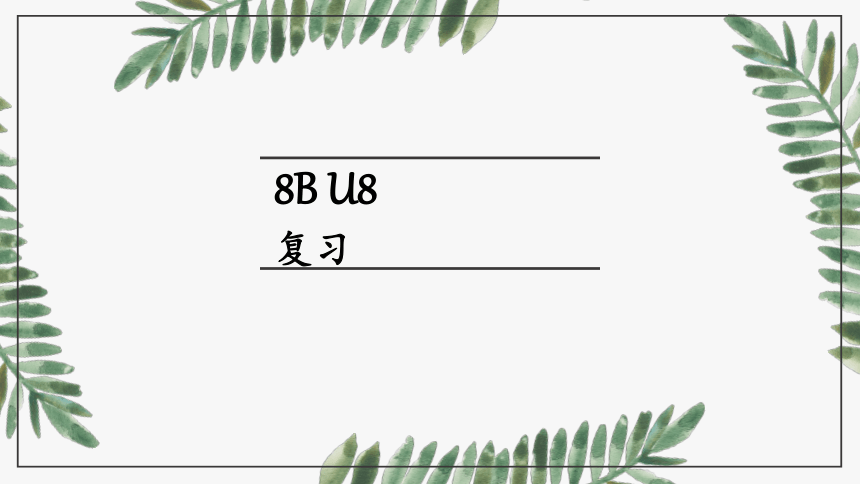 | |
| 格式 | pptx | ||
| 文件大小 | 1.1MB | ||
| 资源类型 | 教案 | ||
| 版本资源 | 牛津译林版 | ||
| 科目 | 英语 | ||
| 更新时间 | 2020-06-30 21:50:59 | ||
图片预览

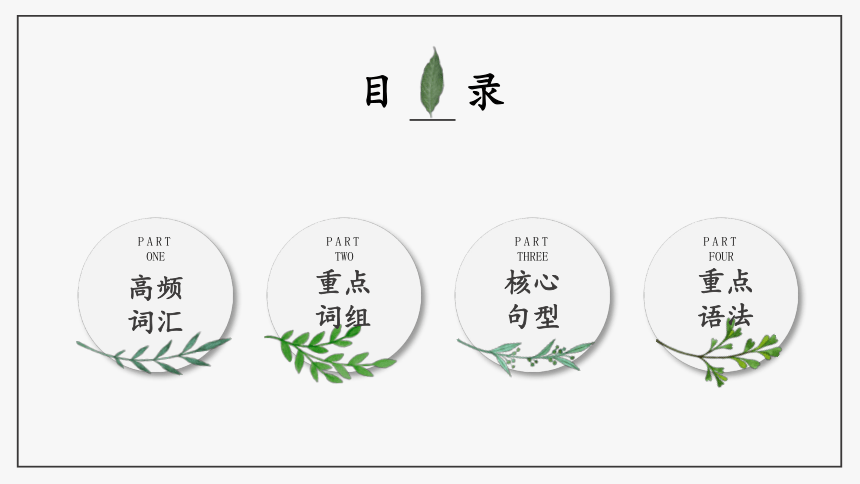
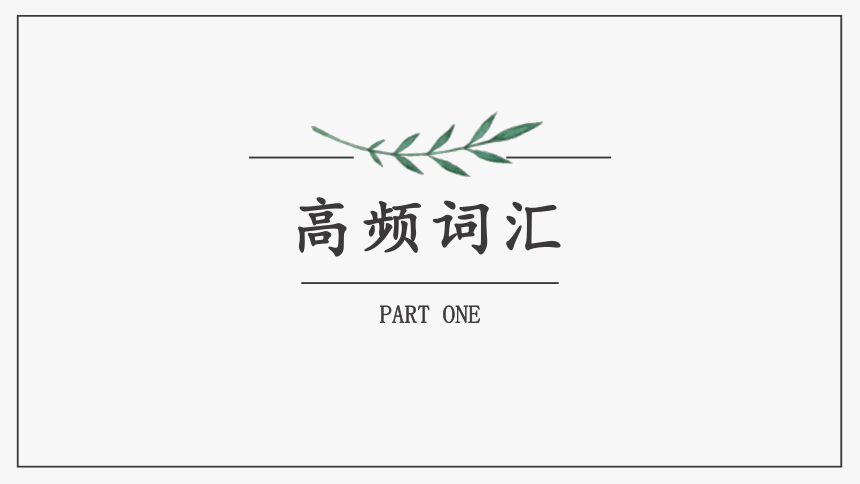
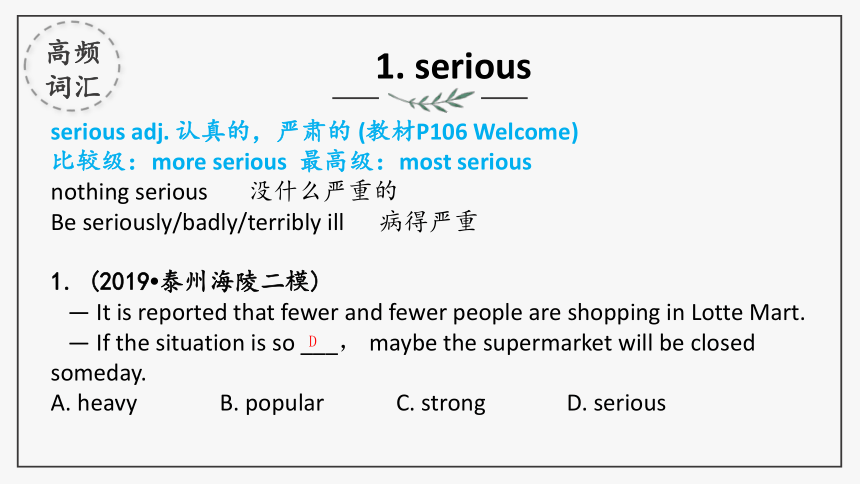
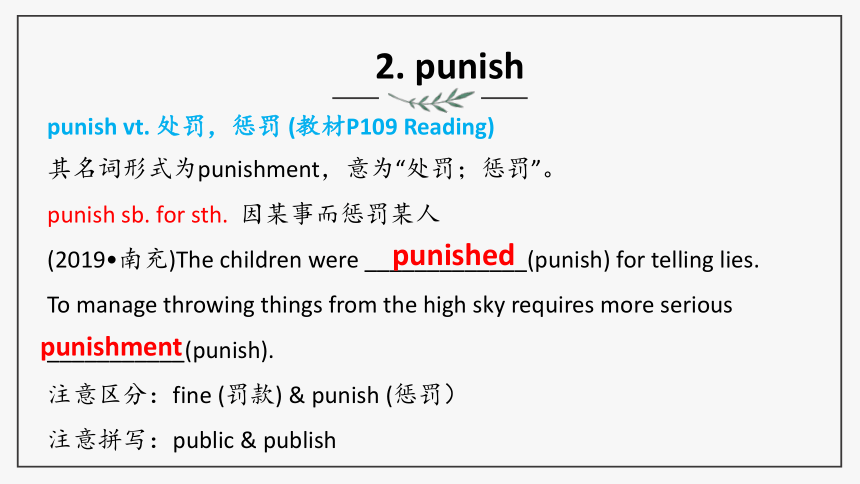
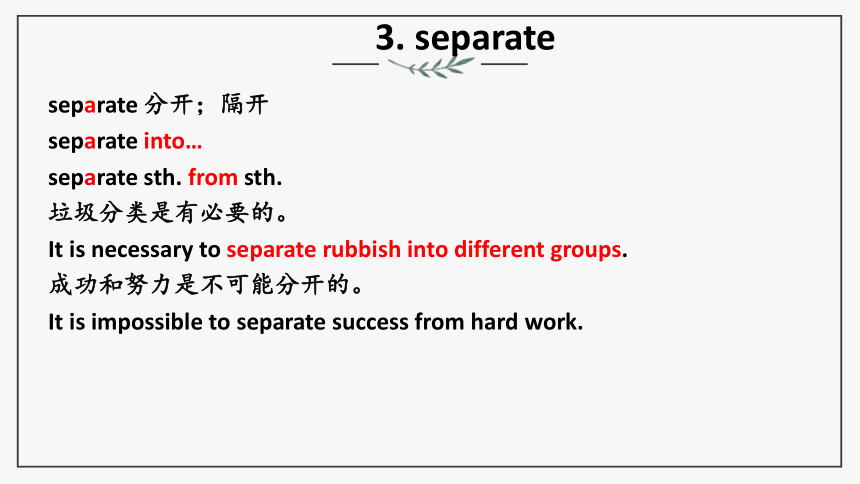
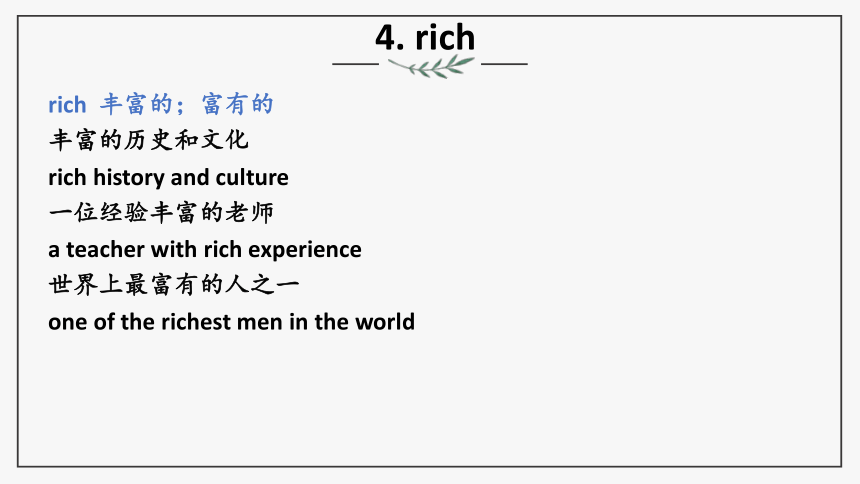
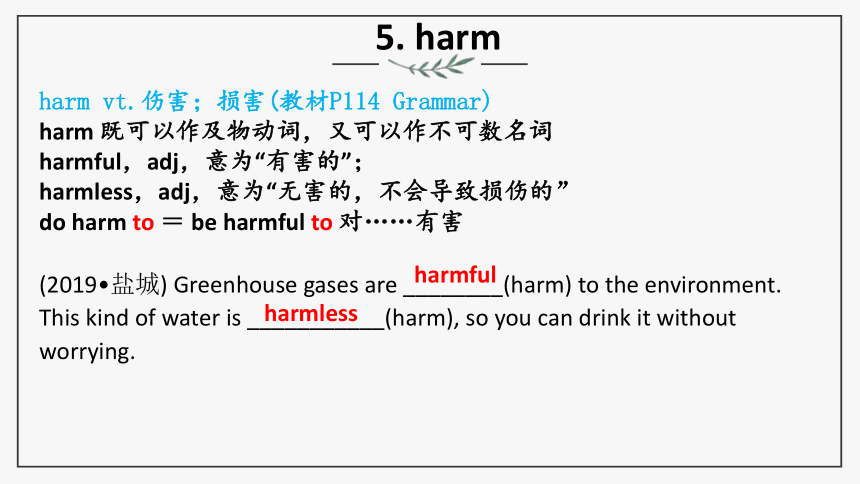
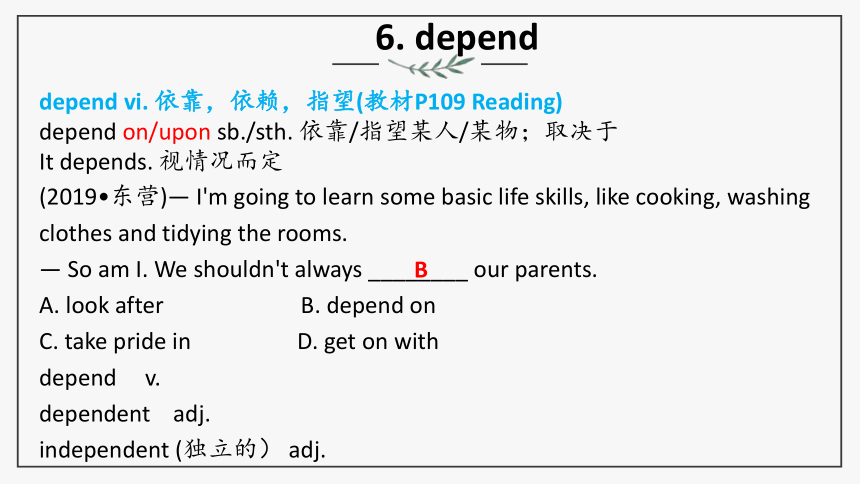
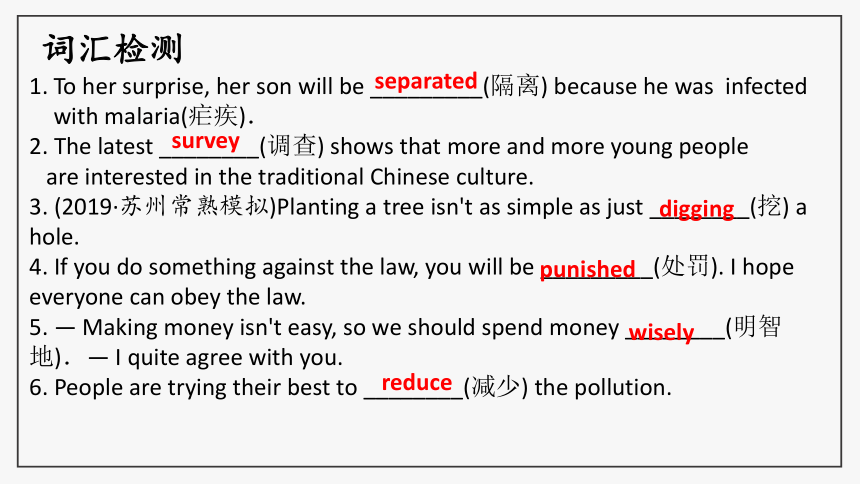
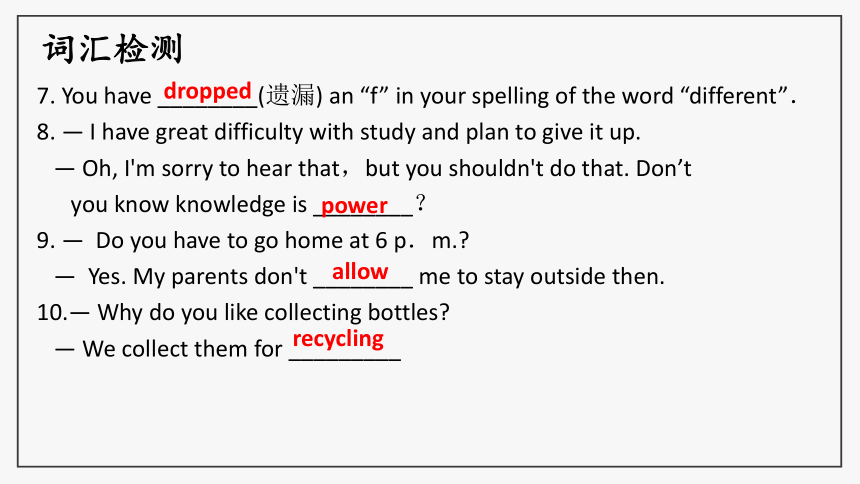
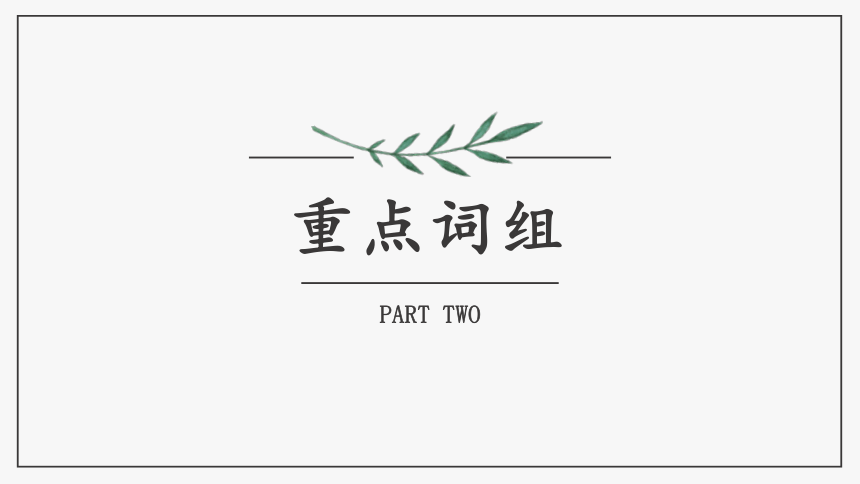
文档简介
8B U8
复习
目 录
PART
ONE
PART
TWO
PART
THREE
PART
FOUR
高频词汇
重点
词组
核心
句型
重点
语法
高频词汇
PART ONE
1. serious
高频词汇
serious adj. 认真的,严肃的 (教材P106 Welcome)
比较级:more serious 最高级:most serious
nothing serious 没什么严重的
Be seriously/badly/terribly ill 病得严重
(2019?泰州海陵二模)
— It is reported that fewer and fewer people are shopping in Lotte Mart.
— If the situation is so ___, maybe the supermarket will be closed someday.
A. heavy B. popular C. strong D. serious
D
2. punish
punish vt. 处罚,惩罚 (教材P109 Reading)
其名词形式为punishment,意为“处罚;惩罚”。
punish sb. for sth. 因某事而惩罚某人
(2019?南充)The children were _____________(punish) for telling lies.
To manage throwing things from the high sky requires more serious ___________(punish).
注意区分:fine (罚款) & punish (惩罚)
注意拼写:public & publish
punished
punishment
3. separate
separate 分开;隔开
separate into…
separate sth. from sth.
垃圾分类是有必要的。
It is necessary to separate rubbish into different groups.
成功和努力是不可能分开的。
It is impossible to separate success from hard work.
4. rich
rich 丰富的;富有的
丰富的历史和文化
rich history and culture
一位经验丰富的老师
a teacher with rich experience
世界上最富有的人之一
one of the richest men in the world
5. harm
harm vt.伤害;损害(教材P114 Grammar)
harm 既可以作及物动词,又可以作不可数名词
harmful,adj,意为“有害的”;
harmless,adj,意为“无害的,不会导致损伤的”
do harm to = be harmful to 对……有害
(2019?盐城) Greenhouse gases are ________(harm) to the environment.
This kind of water is ___________(harm), so you can drink it without worrying.
harmful
harmless
6. depend
depend vi. 依靠,依赖,指望(教材P109 Reading)
depend on/upon sb./sth. 依靠/指望某人/某物;取决于
It depends. 视情况而定
(2019?东营)— I'm going to learn some basic life skills, like cooking, washing clothes and tidying the rooms.
— So am I. We shouldn't always ________ our parents.
A. look after B. depend on
C. take pride in D. get on with
depend v.
dependent adj.
independent (独立的) adj.
B
词汇检测
To her surprise, her son will be _________(隔离) because he was infected with malaria(疟疾).
2. The latest ________(调查) shows that more and more young people
are interested in the traditional Chinese culture.
3. (2019·苏州常熟模拟)Planting a tree isn't as simple as just ________(挖) a hole.
4. If you do something against the law, you will be _________(处罚). I hope everyone can obey the law.
5. — Making money isn't easy, so we should spend money ________(明智地).— I quite agree with you.
6. People are trying their best to ________(减少) the pollution.
separated
survey
digging
punished
wisely
reduce
词汇检测
7. You have ________(遗漏) an “f” in your spelling of the word “different”.
8. — I have great difficulty with study and plan to give it up.
— Oh, I'm sorry to hear that,but you shouldn't do that. Don’t
you know knowledge is ________?
9. — Do you have to go home at 6 p.m.?
— Yes. My parents don't ________ me to stay outside then.
10.— Why do you like collecting bottles?
— We collect them for _________
dropped
power
allow
recycling
重点词组
PART TWO
重点词组
关上(开关)
砍倒
用完,耗尽
对…有影响;起作用
在正确位置
循环使用垃圾
过绿色生活
乘坐地铁
导致严重的空气污染
选择公共交通
1 turn off
2 cut down
3 run out (无被动语态) be used up
4 make a difference to
5 in place
6 recycle waste
7 live a green life
8 take the underground
9 cause serious air pollution
10 choose public transport
重点词组
11 被允许做某事
12 在公共场合扔垃圾
13 被警察罚款
14 限制空气和水污染
15 丰富的资源
16 组织很多活动
17 给人们发传单
18 在演出中被展示
19 采取行动改善环境
20 有机会做某事
11 be allowed to do sth.
12 drop litter in a public place
13 be fined by the police
14 limit air and water pollution
15 rich resources
16 organize many activities
17 send leaflets to people
18 be displayed at the show
19 act to improve the environment
20 have a chance to do sth.
重点词组
21 一项关于学生日常习惯的调查
22 关闭水龙头
23 两面用纸
24 做一项关于…调查
25 减少灰尘
26 对健康有害
27 采取简单的步骤
28 不在使用中
29 恶化
30 形成绿色的生活方式
21 a survey on students’ daily habits
22 turn off the tap
23 use both sides of the paper
24 do a survey on…
25 reduce dust
26 be harmful to health
27 take simple steps
28 be not in use
29 change for the worse
30 develop a green lifestyle
核心句型
PART THREE
Some of the clothes are sold in charity shops, some are given to the poor, and others are sent to factories for recycling. (page 108, lines 8-10)
some…, some…, and others … 一些…, 一些…, 还有一些…
一些学生在安静地看书,一些在做笔记,还有一些在上网查资料。
Some students are reading quietly, some are taking notes, and others are searching for information on the Internet.
2. For example, we are not allowed to cut down trees.
例如,我们不被允许砍树。(教材P108 Reading)
(not) allow sb. to do sth. = sb. is/are (not) allowed to do sth.
(不)允许某人做某事
这所学校不允许学生使用手机。
This school doesn't allow students to use mobile phones.
他不被允许在外面待到太晚。
He is not allowed to stay out too late.
allow doing sth. 允许做某事
我们不允许在房间里抽烟。
We don't allow smoking in the room.
3. Remember that everyone can do something to make a difference!
记住每个人都可以做一些事情让世界有所不同!(教材P109 Reading)
make a difference (to sb./sth.) (对某人/某物)有影响/起作用
make no/some/much difference (to sb./sth.)
(对某人/某物)没影响/有些/有很大作用、关系、影响
这场雨对比赛没多大影响。
The rain did not make much difference to the game.
(2019·无锡新区一模改编)你知道每天一些简单的锻炼就能对你的身体健康带来很大的变化吗?
Do you know that some simple exercise every day can make great difference to your health?
五、 句子翻译。
1. 我们离开房间的时候可以通过关灯来节约能源。
______________________________________________________________
2. 越来越多的家庭拥有小汽车,这导致严重的空气污染。
_____________________________________________________________
3. 假如新能源的使用更加广泛,污染将会大为减少。
_____________________________________________________________
More and more families own cars and this causes serious air pollution.
If new energy is used more widely, there will be much less pollution.
We can save energy by turning off the lights when we leave a room.
4. 如果我们在公共场所扔垃圾将被警方罚款。 _________________________________________________________________
5. 为了找到保护环境的方法,科学家们正在做大量的研究。
______________________________________________________________
______________________________________________________________
If we drop litter in a public place, we will be fined by the police.
In order to find ways to protect the environment, scientists are doing much research.
PART TWO
重点语法
在被动语态中,当动作还没有发生时,需要用一般将来时的被动语态结构。
一般将来时被动语态的肯定句的构成:(以动词help为例)
{5940675A-B579-460E-94D1-54222C63F5DA}主 语
will be/be going to be
过去分词
I
will be/am going to be
helped.
You/We/They
will be/are going to be
He/She/It
will be/is going to be
2. 一般将来时被动语态的否定句的构成:
在助动词will或be going to中的be动词后面加not ( 可缩写)。
3. 一般将来时被动语态的一般疑问句的构成:将助动词will或be going to中的be动词移至句首,其他成分作相应变化。当主语是第一人称时,助动词will也可以用shall代替。
肯定回答用“Yes,主语+ will.”或“Yes,主语+ am/is/are.”。
否定回答用“No,主语+ won't.”或“No,主语+ am not/isn't/aren't.”
4. 一般将来时被动语态的特殊疑问句的结构为“特殊疑问词+一般疑问句?”。对主语提问时,句子结构为“特殊疑问词+ will be/be going to be +过去分词?”。当主语是第一人称时,助动词will也可以用shall代替。如:
— When will these books be published? 这些书将在什么时候被出版?
考点精练
1. (2019?常州)He says the problem ______________(deal) with next year.
2. (2019?镇江)— The plan for the summer study trip may be ___________(cancel).
— Really? I'm looking forward to it.
3. (2019?镇江)Have you heard the 2022 Winter Olympics ________ in Beijing?
A. held B. are held
C. were held D. will be held
4. (2019?连云港)It's reported that the medals for the 2020 Olympic Games in Tokyo ________ from 100% recycled material.
A. are making B. have made
C. is made D. will be made
will be dealt
cancelled
D
D
5. (2019·盘锦)Our life ________ greatly by 3D printing technology in a few years.
A. will influence B. influences
C. will be influenced D. is influenced
6. (2019·昆明)With the rapid progress in high technology, 5G ________ around most parts of China in the near future.
A. is used B. is using
C. will use D. will be used
7. (2019·达州)— Where will the 2022 Winter Olympics ________, Cindy?
— In Beijing, the capital of China, the first city to host both Summer and Winter Olympics.
A. be taken place B. take place
C. take part D. be taken part
C
D
B
8. (2019·遂宁)Some people think trees ________ on Tree Planting Day only.
A. should plant B. should be planted
C. should be plant D. should be planting
9. (2019?南京秦淮一模)Some new schools ________ in Nanjing in the near future, which satisfies the citizens' needs for more resources.
A. were built B. are built
C. will build D. will be built
B
D
10. Some people fear that ________ air pollution may bring about
changes in ________ weather around the world.
A. /; the B. the; / C. an; the D. the; a
11. — Why are more and more countries starting to use new types of energy?
— They cost ________ and are renewable(可再生的).
A. little B. cheap C. low D. much
12. — My mobile phone has ________ of power.
— Really? Then you can use mine. Don't worry.
A. run out B. run away C. run up D. run on
A
A
A
D
A
13. — Will you plant trees tomorrow morning?
— ________. We will go if the weather is fine.
A. That's true B. Of course
C. No problem D. It depends on the weather
14. The music ________ by Tan Dun sounds ________.
A. written; amazing B. written; amazed
C. was written; amazed D. was written; amazing
C
A
15. — I hear local people are trying to prevent some businesses
building factories here.
— Yes. They say the place ________ if some factories ________
in the future.
A. will pollute; will build
B. will be polluted; will be built
C. will be polluted; are built
D. is polluted; are built
16. — ________ English, we should read Chinese every morning to
improve our Chinese.
— Exactly. Now some people are doing ________ than before.
A. Like; better B. As well as; worse
C. Except; better D. Also; worse
17. Without enough trees, soil won't be kept ________.
A. in the place B. on place
C. in place D. on the place
18. — After the sports meeting, there are so many water bottles in
the dustbin.
— So our club will start a project to collect them so that
they will be _____.
A. replied B. returned C. reused D. reduced
19.— Everyone should start to act to go green.
— You're right. We should not ________.
A. do more exercise and watch less TV
B. drive to work or school as much as possible
C. reuse water if possible
D. take shorter showers
C
C
B
Thanks!
复习
目 录
PART
ONE
PART
TWO
PART
THREE
PART
FOUR
高频词汇
重点
词组
核心
句型
重点
语法
高频词汇
PART ONE
1. serious
高频词汇
serious adj. 认真的,严肃的 (教材P106 Welcome)
比较级:more serious 最高级:most serious
nothing serious 没什么严重的
Be seriously/badly/terribly ill 病得严重
(2019?泰州海陵二模)
— It is reported that fewer and fewer people are shopping in Lotte Mart.
— If the situation is so ___, maybe the supermarket will be closed someday.
A. heavy B. popular C. strong D. serious
D
2. punish
punish vt. 处罚,惩罚 (教材P109 Reading)
其名词形式为punishment,意为“处罚;惩罚”。
punish sb. for sth. 因某事而惩罚某人
(2019?南充)The children were _____________(punish) for telling lies.
To manage throwing things from the high sky requires more serious ___________(punish).
注意区分:fine (罚款) & punish (惩罚)
注意拼写:public & publish
punished
punishment
3. separate
separate 分开;隔开
separate into…
separate sth. from sth.
垃圾分类是有必要的。
It is necessary to separate rubbish into different groups.
成功和努力是不可能分开的。
It is impossible to separate success from hard work.
4. rich
rich 丰富的;富有的
丰富的历史和文化
rich history and culture
一位经验丰富的老师
a teacher with rich experience
世界上最富有的人之一
one of the richest men in the world
5. harm
harm vt.伤害;损害(教材P114 Grammar)
harm 既可以作及物动词,又可以作不可数名词
harmful,adj,意为“有害的”;
harmless,adj,意为“无害的,不会导致损伤的”
do harm to = be harmful to 对……有害
(2019?盐城) Greenhouse gases are ________(harm) to the environment.
This kind of water is ___________(harm), so you can drink it without worrying.
harmful
harmless
6. depend
depend vi. 依靠,依赖,指望(教材P109 Reading)
depend on/upon sb./sth. 依靠/指望某人/某物;取决于
It depends. 视情况而定
(2019?东营)— I'm going to learn some basic life skills, like cooking, washing clothes and tidying the rooms.
— So am I. We shouldn't always ________ our parents.
A. look after B. depend on
C. take pride in D. get on with
depend v.
dependent adj.
independent (独立的) adj.
B
词汇检测
To her surprise, her son will be _________(隔离) because he was infected with malaria(疟疾).
2. The latest ________(调查) shows that more and more young people
are interested in the traditional Chinese culture.
3. (2019·苏州常熟模拟)Planting a tree isn't as simple as just ________(挖) a hole.
4. If you do something against the law, you will be _________(处罚). I hope everyone can obey the law.
5. — Making money isn't easy, so we should spend money ________(明智地).— I quite agree with you.
6. People are trying their best to ________(减少) the pollution.
separated
survey
digging
punished
wisely
reduce
词汇检测
7. You have ________(遗漏) an “f” in your spelling of the word “different”.
8. — I have great difficulty with study and plan to give it up.
— Oh, I'm sorry to hear that,but you shouldn't do that. Don’t
you know knowledge is ________?
9. — Do you have to go home at 6 p.m.?
— Yes. My parents don't ________ me to stay outside then.
10.— Why do you like collecting bottles?
— We collect them for _________
dropped
power
allow
recycling
重点词组
PART TWO
重点词组
关上(开关)
砍倒
用完,耗尽
对…有影响;起作用
在正确位置
循环使用垃圾
过绿色生活
乘坐地铁
导致严重的空气污染
选择公共交通
1 turn off
2 cut down
3 run out (无被动语态) be used up
4 make a difference to
5 in place
6 recycle waste
7 live a green life
8 take the underground
9 cause serious air pollution
10 choose public transport
重点词组
11 被允许做某事
12 在公共场合扔垃圾
13 被警察罚款
14 限制空气和水污染
15 丰富的资源
16 组织很多活动
17 给人们发传单
18 在演出中被展示
19 采取行动改善环境
20 有机会做某事
11 be allowed to do sth.
12 drop litter in a public place
13 be fined by the police
14 limit air and water pollution
15 rich resources
16 organize many activities
17 send leaflets to people
18 be displayed at the show
19 act to improve the environment
20 have a chance to do sth.
重点词组
21 一项关于学生日常习惯的调查
22 关闭水龙头
23 两面用纸
24 做一项关于…调查
25 减少灰尘
26 对健康有害
27 采取简单的步骤
28 不在使用中
29 恶化
30 形成绿色的生活方式
21 a survey on students’ daily habits
22 turn off the tap
23 use both sides of the paper
24 do a survey on…
25 reduce dust
26 be harmful to health
27 take simple steps
28 be not in use
29 change for the worse
30 develop a green lifestyle
核心句型
PART THREE
Some of the clothes are sold in charity shops, some are given to the poor, and others are sent to factories for recycling. (page 108, lines 8-10)
some…, some…, and others … 一些…, 一些…, 还有一些…
一些学生在安静地看书,一些在做笔记,还有一些在上网查资料。
Some students are reading quietly, some are taking notes, and others are searching for information on the Internet.
2. For example, we are not allowed to cut down trees.
例如,我们不被允许砍树。(教材P108 Reading)
(not) allow sb. to do sth. = sb. is/are (not) allowed to do sth.
(不)允许某人做某事
这所学校不允许学生使用手机。
This school doesn't allow students to use mobile phones.
他不被允许在外面待到太晚。
He is not allowed to stay out too late.
allow doing sth. 允许做某事
我们不允许在房间里抽烟。
We don't allow smoking in the room.
3. Remember that everyone can do something to make a difference!
记住每个人都可以做一些事情让世界有所不同!(教材P109 Reading)
make a difference (to sb./sth.) (对某人/某物)有影响/起作用
make no/some/much difference (to sb./sth.)
(对某人/某物)没影响/有些/有很大作用、关系、影响
这场雨对比赛没多大影响。
The rain did not make much difference to the game.
(2019·无锡新区一模改编)你知道每天一些简单的锻炼就能对你的身体健康带来很大的变化吗?
Do you know that some simple exercise every day can make great difference to your health?
五、 句子翻译。
1. 我们离开房间的时候可以通过关灯来节约能源。
______________________________________________________________
2. 越来越多的家庭拥有小汽车,这导致严重的空气污染。
_____________________________________________________________
3. 假如新能源的使用更加广泛,污染将会大为减少。
_____________________________________________________________
More and more families own cars and this causes serious air pollution.
If new energy is used more widely, there will be much less pollution.
We can save energy by turning off the lights when we leave a room.
4. 如果我们在公共场所扔垃圾将被警方罚款。 _________________________________________________________________
5. 为了找到保护环境的方法,科学家们正在做大量的研究。
______________________________________________________________
______________________________________________________________
If we drop litter in a public place, we will be fined by the police.
In order to find ways to protect the environment, scientists are doing much research.
PART TWO
重点语法
在被动语态中,当动作还没有发生时,需要用一般将来时的被动语态结构。
一般将来时被动语态的肯定句的构成:(以动词help为例)
{5940675A-B579-460E-94D1-54222C63F5DA}主 语
will be/be going to be
过去分词
I
will be/am going to be
helped.
You/We/They
will be/are going to be
He/She/It
will be/is going to be
2. 一般将来时被动语态的否定句的构成:
在助动词will或be going to中的be动词后面加not ( 可缩写)。
3. 一般将来时被动语态的一般疑问句的构成:将助动词will或be going to中的be动词移至句首,其他成分作相应变化。当主语是第一人称时,助动词will也可以用shall代替。
肯定回答用“Yes,主语+ will.”或“Yes,主语+ am/is/are.”。
否定回答用“No,主语+ won't.”或“No,主语+ am not/isn't/aren't.”
4. 一般将来时被动语态的特殊疑问句的结构为“特殊疑问词+一般疑问句?”。对主语提问时,句子结构为“特殊疑问词+ will be/be going to be +过去分词?”。当主语是第一人称时,助动词will也可以用shall代替。如:
— When will these books be published? 这些书将在什么时候被出版?
考点精练
1. (2019?常州)He says the problem ______________(deal) with next year.
2. (2019?镇江)— The plan for the summer study trip may be ___________(cancel).
— Really? I'm looking forward to it.
3. (2019?镇江)Have you heard the 2022 Winter Olympics ________ in Beijing?
A. held B. are held
C. were held D. will be held
4. (2019?连云港)It's reported that the medals for the 2020 Olympic Games in Tokyo ________ from 100% recycled material.
A. are making B. have made
C. is made D. will be made
will be dealt
cancelled
D
D
5. (2019·盘锦)Our life ________ greatly by 3D printing technology in a few years.
A. will influence B. influences
C. will be influenced D. is influenced
6. (2019·昆明)With the rapid progress in high technology, 5G ________ around most parts of China in the near future.
A. is used B. is using
C. will use D. will be used
7. (2019·达州)— Where will the 2022 Winter Olympics ________, Cindy?
— In Beijing, the capital of China, the first city to host both Summer and Winter Olympics.
A. be taken place B. take place
C. take part D. be taken part
C
D
B
8. (2019·遂宁)Some people think trees ________ on Tree Planting Day only.
A. should plant B. should be planted
C. should be plant D. should be planting
9. (2019?南京秦淮一模)Some new schools ________ in Nanjing in the near future, which satisfies the citizens' needs for more resources.
A. were built B. are built
C. will build D. will be built
B
D
10. Some people fear that ________ air pollution may bring about
changes in ________ weather around the world.
A. /; the B. the; / C. an; the D. the; a
11. — Why are more and more countries starting to use new types of energy?
— They cost ________ and are renewable(可再生的).
A. little B. cheap C. low D. much
12. — My mobile phone has ________ of power.
— Really? Then you can use mine. Don't worry.
A. run out B. run away C. run up D. run on
A
A
A
D
A
13. — Will you plant trees tomorrow morning?
— ________. We will go if the weather is fine.
A. That's true B. Of course
C. No problem D. It depends on the weather
14. The music ________ by Tan Dun sounds ________.
A. written; amazing B. written; amazed
C. was written; amazed D. was written; amazing
C
A
15. — I hear local people are trying to prevent some businesses
building factories here.
— Yes. They say the place ________ if some factories ________
in the future.
A. will pollute; will build
B. will be polluted; will be built
C. will be polluted; are built
D. is polluted; are built
16. — ________ English, we should read Chinese every morning to
improve our Chinese.
— Exactly. Now some people are doing ________ than before.
A. Like; better B. As well as; worse
C. Except; better D. Also; worse
17. Without enough trees, soil won't be kept ________.
A. in the place B. on place
C. in place D. on the place
18. — After the sports meeting, there are so many water bottles in
the dustbin.
— So our club will start a project to collect them so that
they will be _____.
A. replied B. returned C. reused D. reduced
19.— Everyone should start to act to go green.
— You're right. We should not ________.
A. do more exercise and watch less TV
B. drive to work or school as much as possible
C. reuse water if possible
D. take shorter showers
C
C
B
Thanks!
